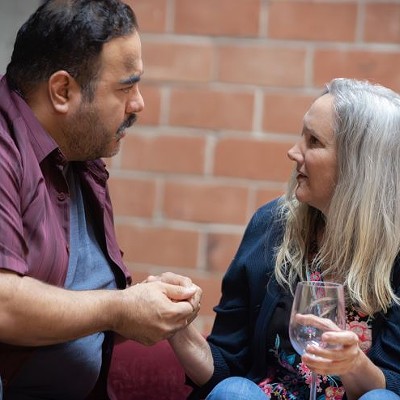Nostalgia de la Luz (Nostalgia for the Light) was directed by Patricio Guzmán.
In the Atacama Desert in northern Chile, two groups of people search for answers. Astronomers from around the world who have flocked to the area for the crystal clear views of the night sky scan the skies for clues to the origins of the universe. And from across Chile, women search the ground for the remains of their loved ones, people who were disappeared under the Pinochet regime and are thought to have been buried in mass graves there. Documentary filmmaker Patricio Guzmán's poetic and tender Nostalgia for the Light uses one story to tell the other.
Guzmán, who is in town for the Cinema Arts Festival Houston's screening of a slate of his films including Nostalgia, begins his story with scenes of the giant telescopes that dot the Atacama Desert, close-ups of the gears and wheels that position the huge machines. There are no people, just immense, metal machines. Then the observatory's ceiling is opened and a blinding white light floods the screen.
"When I'm filming and then editing, I think I'm making this film so that people can see it," Guzmán tells Art Attack. "And for people to be moved, I must use methaphors, poetry, imagination. If I began the film with the darkest part of the story, people would leave the theaters within ten minutes. But if I begin with astronomy, with the methaphor that all the stars are in the distant past and the present is a very thin line, with an astronomer who is intelligent and interesting, then the people become involved. Then, softly, I begin the story of the women."
And that story is heartbreaking. We see a pair of women who after 20 years still scour the desert looking for bits of bone or fabric, anything that might lead them to a body. (Weather conditions on the desert mummify the buried bodies, meaning that the women sometimes discover recognizable remains.)
One woman, 70 years old, says that she'll continue to search for her husband because she can't believe government reports that the bodies were dumped at sea. She says it's more likely they were just moved to another part of the desert, so she'll keep looking.
Another woman recoups the partial skull and foot of her brother, but she knows it's unlikely any more of him will be found. (The bulldozers used to move the bodies would scoop up the bulk of the body, but the heads and feet, which often fell to one side or another, would be left behind.)
An astronomer who shares the desert with the women discusses their distinctive experiences. "There is one big difference between us," he says. "We can sleep at night. These women must find it hard to sleep after searching through human remains, looking for a past they are unable to find. They'll not sleep well until they do so.
"It's strange," he goes on, "that society should understand astronomers and their search for the past better than they understand these women."
All of this Guzmán shows with no added emotion. The speakers most often recount their stories calmly, without tears. "In documentary filmmaking," he says, "there are various concepts that are basic. One is to have a point of view, to have an opinion about what you're discussing. And second is to have a good distance. That means that even though you might be passionate about a subject, you must be able to have some perspective.
"The country is accustomed to swallowing lots of pain, the same way that so many other Latin American countries are. At the same time, we have inherited a tragic history and we must turn it around. It must become a road to the future for us. Everyone wants reconciliation, but without truth, that's not possible. I keep doing this because I know that 100 years from now, young Chileans will see my films and be very happy with what I've done."
Guzmán presents Robinson Crusoe Island and My Jules Verne at 7 p.m. on Friday, and Nostalgia for the Light at 7 p.m. on Saturday. Rice Cinema, 6100 Main. For information, visit www.cinemartsociety.org or call 713-429-0420. $9.





